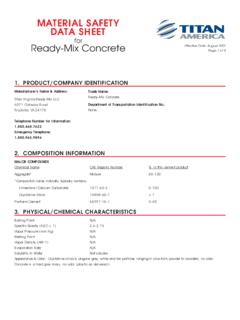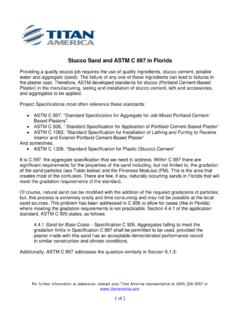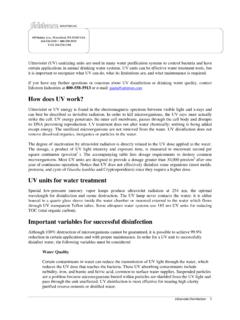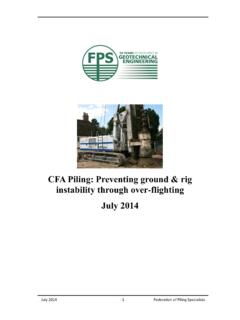Transcription of Portland Cement/Lime vs. Masonry Cement/Stucco
1 For further information or assistance, contact your Titan America representative at (800) 226-2057 or 1 Portland Cement/Lime vs. Masonry Cement/Stucco The use of Portland Cement/Lime mortars for unit Masonry and/or stucco was the standard of the industry for nearly a century. Though considered antiquated, it is still specified today, primarily on military projects or projects located in the northern states. Since the introduction of specialized Masonry cements, the use of Cement/Lime mortars has declined, particularly in the sun-belt states.
2 Advantage of Cement/Lime mortars: Extensive history of successful use. Claims to have better bond ability, though no clear advantage can as yet be measured. Claims to be more water tight. Disadvantages of Portland Cement/Lime Mortars: Higher cost. Options of Cement/Lime Mortar or Purchasing Portland cement and Lime separately are both more costly than stucco cement . Limited availability. Only one manufacturer in Florida markets a pre-packaged Cement/Lime mix. Located in North Florida.
3 Less workability; slows down jobsite production. Higher lime content may lead to more lime burn issues (contact dermatitis) within workforce. Lack of availability means using jobsite blended Portland cement and Type S Hydrated Lime. This results in inconsistency of the mix from one batch to the next which can have major detrimental effects on the finish product. Not recommended for high sulfate exposure. Masonry Cements and stucco are a blend of Portland cement and other performance-enhancing admixtures; some of which may be ground limestone, clay and a variety of chemicals.
4 The use of Masonry cements began shortly after WWII and has become the preferred product throughout the country. The caustic, Type S Hydrated Lime, is replaced by these admixtures. These admixtures greatly enhance the workability and performance of the mortars. Advantages of Masonry cement mortars and stucco : Over 6 decades of proven use. Lower cost. More availability. All Florida manufacturers produce Masonry cements. Increased workability providing for higher jobsite production rates.
5 For further information or assistance, contact your Titan America representative at (800) 226-2057 or 2 Enhanced setting times and water retention rates help to reduce shrinkage cracking. Air contents are limited by ASTM C270 to under 18%. Increased protection in high sulfate environments. Pre-packaged blend means less chance of inconsistency of the mixed mortar. There was a study in Texas a few years ago that purports to show that Portland Cement/Lime mortars allow less water penetration through the walls system.
6 There is an ASTM Standard for testing this. It is ASTM E-514 and it is designed to simulate a wind-driven rain. In short, it calls for water to be sprayed onto a sample wall, with a stucco thickness of 3/8 inch, at the rate of gal/ft2 per hour at a pressure of 10 lbs/ft2 for 4 hours. This is an extreme amount of water compared to a serious rainstorm in Florida. This test shows no penetration at 3/8 inch thickness. A 3/8 inch coat does not meet the Florida Building Code; which defines stucco as a weather resistant coating but only when applied to the minimum thicknesses prescribed by ASTM C 926.
7 FC & PA along with the NCMA are currently conducting this test at other thicknesses. It has been shown already that at inch thickness (minimum code) of properly placed and consolidated stucco there was no penetration at all. How can there be less than none? The key to preventing water penetration in plastered walls is in the proper consolidating and curing of the plaster and in properly flashing and sealing penetrations through the walls system regardless of the type of plaster used.
8 G. Michael Starks, CGC, CDT, CCPR, LEED AP Specifications Representative











